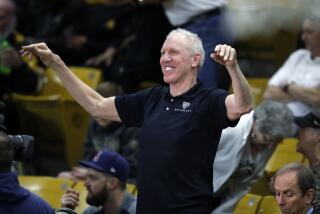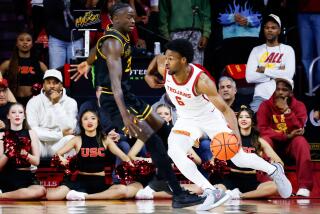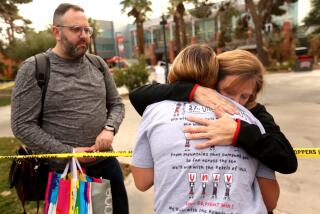He’s in Right Place at Right Time : Basketball: Salahuddin making most of chance at Long Beach State after two gunshot incidents scared away many recruiters.
- Share via
LONG BEACH — Rasul Salahuddin lay in the street with a hole in his right knee, bullets flying above him and screams ringing in his ears, so it seemed like a good time for some serious self-evaluation.
Salahuddin had been shot for the second time in three weeks during the summer of 1993 near his home in Mount Vernon, N.Y. A talented basketball player, Salahuddin made an important decision as he watched his blood spread across the ground: time to start making better choices.
He is, and Long Beach State benefits from his maturity. Salahuddin starts at point guard for the 49ers, who play in Michigan State’s Spartan Classic on Thursday and Friday at East Lansing, Mich.
“I’ve learned you just have to watch where you go and the people you’re around,” Salahuddin said. “You don’t know what’s going to happen anywhere you go, but you have to try to be aware of everything that’s going on.”
Admittedly, this is a major outlook adjustment by Salahuddin (pronounced saul-uh-HOO-den). But if gunshot wounds won’t inspire behavior modification, what will?
The first time was in July at a nightclub in New Rochelle, N.Y. A fight erupted and shots were fired.
Salahuddin, who was not involved in the altercation, was grazed on his right hip by a bullet. He was one of nine people shot.
Then in August, Salahuddin took a bullet in his right knee while attending a block party in Mount Vernon. Again, a fight started and he was not the intended target.
In both shootings, he said he didn’t see who fired the gun.
Salahuddin and those who know him maintain his involvement was simply a case of timing--all bad. They’re also in agreement, though, that Salahuddin’s judgment was less-than sound when selecting friends and putting himself in clearly risky situations.
“It looks bad being that I had gotten shot two times within three weeks,” Salahuddin said. “A lot of people were like, ‘What’s wrong with this kid?’
“I was just in the wrong place at the wrong time, but unfortunately it had to happen to me.”
Unlike the first incident, the second was extremely serious.
The bullet created a hole the size of a quarter as it exited his knee. Friends drove him to a hospital.
“I was thinking, ‘Damn, what’s going on?’ ” he said. “Why me? Why did I have to get shot in the knee of all places?”
Al-farid Salahuddin was even more scared than his son.
“My cousin called me at work and said, ‘You better get to the hospital, your son has been shot,’ ” said Al-farid, a firefighter in Mount Vernon.
“I just couldn’t believe it happened again. Then I saw his knee.”
Rasul underwent surgery to remove scar tissue. No ligaments were damaged.
The bullet missed his kneecap by about a quarter-inch, by far the best news for the Salahuddin family. Salahuddin remained in the hospital for a week.
“That would have been it for basketball if it hit my kneecap,” he said. “My knee would have had to (have) been totally reconstructed.”
Even so, Al-farid wondered if his son would ever play again.
“I really felt bad for Rasul because he’d worked so hard and he had so much potential,” he said. “To have it go so quickly by some nonsense by someone acting stupid. . . . It was numbing.”
However, he also was upset Rasul put himself in a dangerous environment.
“The thing is,” Al-farid said, “he shouldn’t have even been there.”
Dave Rose also was concerned.
Salahuddin played for Rose at Dixie College in St. George, Utah, as a freshman the previous season. Rose didn’t know what to make of the news he heard from New York.
“My question was, ‘How is this happening?’ ” Rose said. “That’s some pretty bad luck for a kid to get shot twice.
“I talked to his dad and he told me Rasul was hanging out with some of his high school buddies in some pretty bad parts of town. My biggest concern the second time he got shot was to get him out of New York and get him here.”
Salahuddin arrived in Utah about two weeks after leaving the hospital.
“When he showed me his knee,” Rose said, “I thought he would never play again.”
An optimist’s optimist, Salahuddin never doubted his recovery.
“I never think the worst things are going to happen,” he said. “Even when I was laying there in that hospital, I knew I was going to play again.”
Salahuddin dedicated himself to an intense rehabilitation program and had an excellent sophomore season. He averaged 11.2 points, 6.6 rebounds and four assists as Dixie won its conference title. He was selected first-team all-conference.
Recruiters from four-year schools, however, weren’t hounding Salahuddin anymore. And he knew why.
“A lot of schools backed off of me because of the fact I had gotten shot twice,” Salahuddin said, “and they thought I was a bad person.”
Al-farid heard the rumors.
“One recruiter I know personally, a coach at a big-time school, was telling people that Rasul was involved with drugs, that (the shootings) had to be drug things,” he said. “This was a guy who’s known Rasul since he was a child.
“Once that reputation got out there, Rasul was done.”
Long Beach wasn’t scared away.
Assistant coach Clyde Vaughan grew up in New York and knew the Salahuddin family. He vouched for Rasul, encouraging 49er Coach Seth Greenberg to offer him a scholarship.
“He was doing some things he shouldn’t have done, and that caused people to talk bad about Rasul,” Vaughan said. “But he’s the nicest person.
“I knew that and I told coach that, so it was no problem.”
Salahuddin’s play hasn’t been a problem either.
Because senior point guard Tye Mays, an occasional starter last season, was ineligible during the fall semester, the starting position was open. Salahuddin won the job going away. He averages eight points and six assists for the 49ers, who are 3-1.
Rose converted Salahuddin from shooting guard to the point at Dixie. Salahuddin, 21, works on his dribbling in one-on-one morning sessions with assistant coach John Welch, and Salahuddin credits him for his continued improvement.
Salahuddin is at his best when opponents have the ball. His defensive quickness, strength and long arms cause problems for ballhandlers. He already has 18 steals, a remarkable number after only four games.
“I made a prediction a long time ago,” Vaughan said, “that Rasul would lead the nation in steals if he plays 28 minutes per game.”
Leaping is about the only part of his game not back to pre-shooting form. While he was at Mount Vernon High, Salahuddin was known around New York playgrounds and gymnasiums for his leaping ability.
“He’s not fully recovered because when Rasul’s recovered, all those fast breaks that he’s laying in will be two-handed dunks,” Greenberg said. “He literally lost six inches of explosiveness off his vertical leap.”
Still, he’s one of the 49ers’ best leapers. In Long Beach’s 71-64 season-opening victory over Detroit Mercy, Salahuddin left his teammates in awe by driving along the baseline and throwing down a fierce dunk late in the second half.
“I’d kill for half of his hops,” senior forward Mike Atkinson said.
Salahuddin is dedicated to repaying the 49er coaching staff for its belief in him.
“When the phone stopped ringing, (Long Beach) was the only school that stuck by me,” Salahuddin said. “No matter what happens, I know they’ll be there.”
More to Read
Go beyond the scoreboard
Get the latest on L.A.'s teams in the daily Sports Report newsletter.
You may occasionally receive promotional content from the Los Angeles Times.










